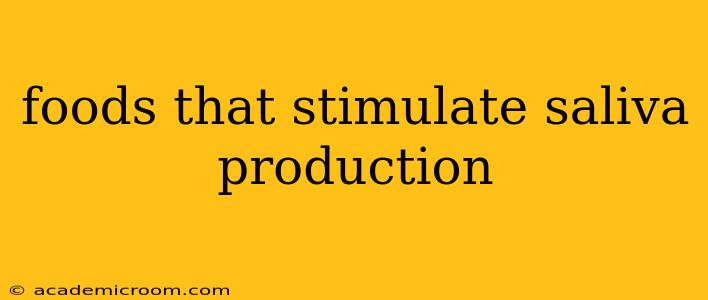Saliva, that often-overlooked bodily fluid, plays a crucial role in oral health, digestion, and overall well-being. Its production, however, can be affected by various factors, including dehydration, medication, and even the foods we consume. Understanding which foods stimulate saliva production can be incredibly beneficial for maintaining good oral hygiene and preventing dry mouth (xerostomia), a condition that can lead to discomfort and dental problems. This comprehensive guide delves into the science behind saliva production and highlights the best foods to naturally boost your saliva flow.
What Causes Dry Mouth?
Before we dive into saliva-stimulating foods, let's briefly understand the underlying causes of dry mouth. Many factors can contribute to decreased saliva production, including:
- Dehydration: Lack of sufficient water intake is a primary culprit.
- Medications: Numerous medications, including antidepressants, antihistamines, and diuretics, list dry mouth as a side effect.
- Medical conditions: Conditions like diabetes, Sjogren's syndrome, and Parkinson's disease can affect saliva production.
- Radiation therapy: Radiation treatments targeting the head and neck area can damage salivary glands.
- Age: Saliva production naturally decreases with age.
- Anxiety and stress: These factors can significantly impact bodily functions, including saliva production.
Foods That Stimulate Saliva Production
Now, let's explore the delicious world of foods that can help stimulate your salivary glands and keep your mouth feeling moist and comfortable.
Sour Foods:
Many people instinctively reach for something sour when their mouth feels dry. This is because sour tastes trigger a powerful salivary response. Excellent examples include:
- Lemons and limes: These citrus fruits are packed with citric acid, a potent saliva stimulant. A simple slice of lemon in water can be remarkably effective.
- Cranberries: These tart berries are not only delicious but also help stimulate saliva production, contributing to better oral health.
- Vinegar (in moderation): A small amount of vinegar, particularly apple cider vinegar, can trigger saliva production, but excessive consumption can damage tooth enamel.
Chewy Foods:
The act of chewing itself stimulates saliva production. Therefore, incorporating chewy foods into your diet can be beneficial:
- Fruits and vegetables: Apples, carrots, and celery require significant chewing, leading to increased saliva flow.
- Nuts and seeds: These require thorough chewing, promoting saliva production and providing healthy fats and nutrients.
Sugary Foods (in moderation):
While excessive sugar consumption is detrimental to oral health, a small amount of sugar can, surprisingly, stimulate saliva. However, it's crucial to balance this with good oral hygiene practices:
- Candies (sugar-free preferred): Sugar-free candies, especially those containing xylitol, can be a helpful option, although always consult a dentist before making this a regular part of your routine.
Spicy Foods:
Spicy foods, particularly those containing capsaicin, can also trigger increased saliva production:
- Chili peppers: The heat from chili peppers stimulates the salivary glands, helping to counteract dryness. However, remember that excessive spice can irritate sensitive mouths.
What about fruits and vegetables in general?
Most fruits and vegetables, regardless of their sourness or chewiness, contribute to increased saliva production simply because of the process of eating them. The mechanical stimulation of chewing, combined with the flavor profiles, often leads to a natural increase in saliva.
H2: What drinks stimulate saliva production?
While food is the primary focus, certain beverages can also help. Water is the most essential, as dehydration is a major cause of dry mouth. Unsweetened tea and sugar-free drinks can also be helpful, but avoid excessive caffeine and alcohol, as these can have a dehydrating effect.
H2: Are there any supplements to help with dry mouth?
Several supplements claim to stimulate saliva production. However, it's crucial to consult with your doctor or dentist before taking any supplements, as they can interact with existing medications.
H2: When should I see a dentist about dry mouth?
Persistent dry mouth, regardless of dietary changes, warrants a visit to your dentist. Dry mouth can be a symptom of underlying health conditions, and your dentist can help determine the cause and recommend appropriate treatment.
By incorporating these saliva-stimulating foods into your diet and maintaining good oral hygiene practices, you can effectively combat dry mouth and promote overall oral health. Remember that this information is for general knowledge and does not replace professional medical advice. If you have concerns about dry mouth, consult your doctor or dentist.
